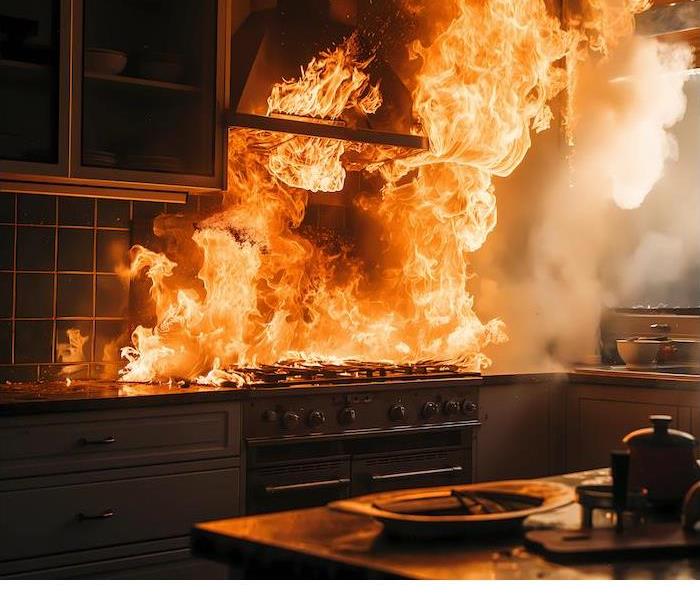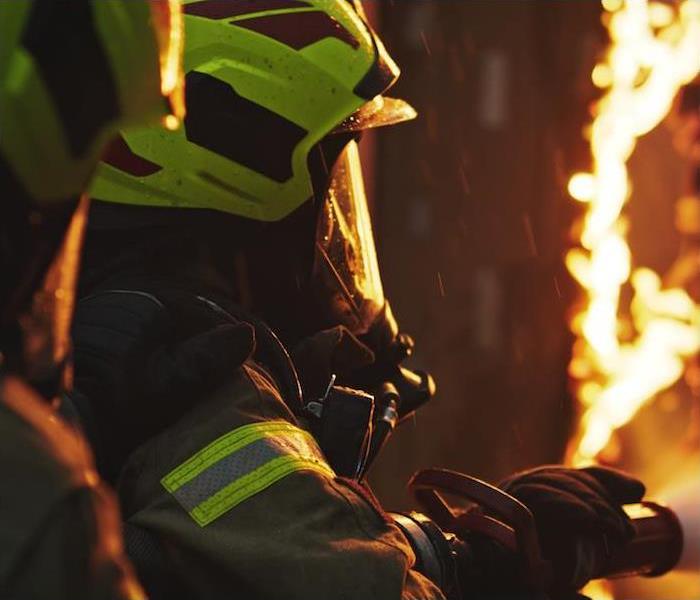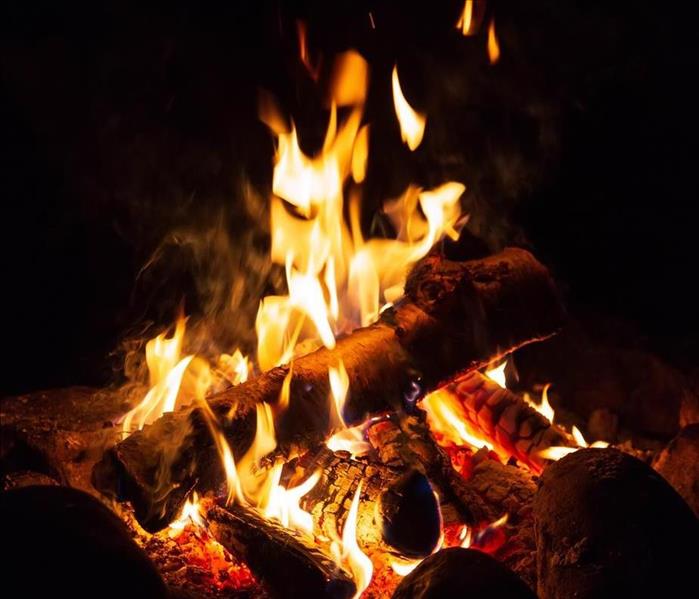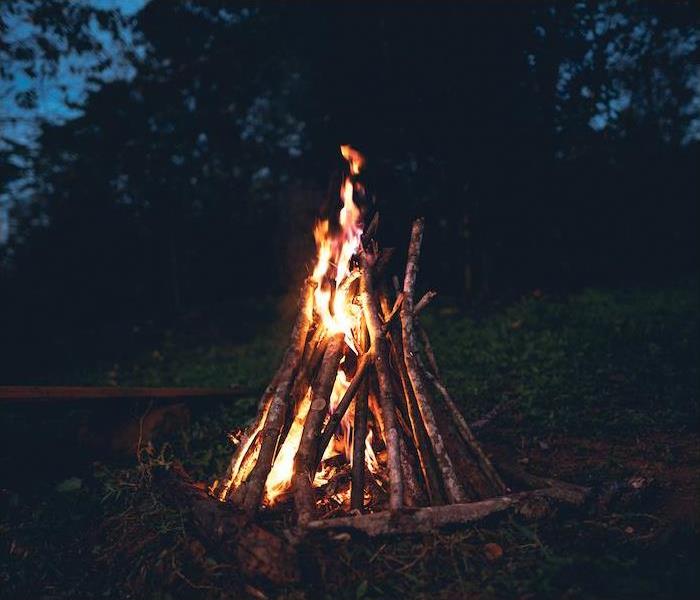Thanksgiving Fire Safety: A Guide for Apartment Dwellers
11/26/2024 (Permalink)
 Celebrate Thanksgiving safely—follow fire safety tips, and trust SERVPRO for restoration if needed!
Celebrate Thanksgiving safely—follow fire safety tips, and trust SERVPRO for restoration if needed!
Thanksgiving is a time for families to come together and celebrate with delicious meals, but cooking in an apartment complex or high-rise presents unique challenges and fire hazards. At SERVPRO®, we’re dedicated to helping you enjoy a safe and festive Thanksgiving. Here are essential tips for Thanksgiving fire safety, particularly when preparing your meal in a shared living space. Ensuring a Safe Cooking Environment
When cooking in an apartment, maintaining a safe kitchen environment is crucial. Start by keeping flammable items, such as dish towels, paper products, and packaging materials, away from your stovetop and any heat sources. In a high-rise setting, it’s especially important to remain focused while cooking; distractions can lead to accidents. If you need to step away, even for just a moment, be sure to turn off the heat to prevent any potential fires.
Additionally, check that your smoke detectors are in good working order. Make sure the batteries are fresh, as these alarms are your first line of defense against fire hazards. It’s also wise to familiarize yourself with the fire exits and evacuation routes in your building, as this can help you act quickly in case of an emergency.
Safe Cooking Practices in Shared Spaces
Cooking in a shared kitchen or apartment means being considerate of your neighbors and taking extra precautions. Avoid using deep fryers indoors, as they can create dangerous situations. If you’re considering deep frying a turkey, always do so outdoors, away from the building and any overhanging structures. Make sure your turkey is fully thawed and dry to prevent dangerous oil splattering.
When cooking on the stovetop, never leave pots or pans unattended. If you find yourself distracted, ask a neighbor or family member to keep an eye on your food. It’s also a good idea to use timers to remind yourself when to check on your dishes. In case of a small kitchen fire, know how to use a fire extinguisher, and never attempt to put out a grease fire with water, as it can exacerbate the flames.
Post-Meal Safety Measures
After the Thanksgiving feast, it’s essential to prioritize safety as you clean up. Turn off all cooking appliances and avoid leaving leftovers out at room temperature for more than two hours. Refrigerate leftovers promptly to prevent foodborne illnesses and maintain a clean kitchen environment. When disposing of cooking oil, let it cool completely before transferring it to a sealed container for safe disposal.
As you tidy up, ensure that hot pots and pans are not left unattended. Allow them to cool before washing or storing them. In an apartment complex, it’s important to keep common areas clear and free of any potential fire hazards, so be mindful of clutter in shared spaces.
Thanksgiving is a time for gratitude and connection, but it’s vital to prioritize safety, especially in a high-rise or apartment setting. By following these Thanksgiving fire safety tips, you can enjoy a worry-free holiday with your loved ones. If a fire occurs in your home, remember that SERVPRO is here to assist with fire damage restoration and cleanup.
Urban Living and Fire Safety: Protecting Your Home During Summer
8/2/2024 (Permalink)
 SERVPRO is ready to help you have a fire-safe summer season with these helpful tips!
SERVPRO is ready to help you have a fire-safe summer season with these helpful tips!
Living in a city brings its own set of joys and challenges, especially when it comes to fire safety during the summer months. As you navigate urban life, it’s essential to prioritize fire safety to safeguard your home and community.
Here are some key tips to ensure a safe and enjoyable summer while living in a city.
Apartment Fire Safety: Prevention and Preparedness
- In densely populated urban areas, apartment buildings are common living spaces. Fire safety in apartments begins with prevention. Ensure smoke detectors are installed in every room and hallway and test them monthly to ensure they are functioning correctly. Know the location of fire exits and familiarize yourself with the building’s evacuation plan. Keep hallways and stairwells clear of obstructions that could impede evacuation in an emergency.
- When cooking, especially on hot summer days, avoid leaving the stove or oven unattended. Keep flammable items such as towels and curtains away from cooking appliances. If you use a grill on a balcony or rooftop, make sure it’s permitted by building regulations and keep it well away from any flammable materials.
City Parks and Public Spaces: Responsible Outdoor Activities
- City parks and public spaces are hubs of summer activity, from picnics to outdoor events. When enjoying these areas, be mindful of fire safety guidelines. Use designated grilling areas provided by parks and avoid setting up open fires outside of designated fire pits or areas. Dispose of hot coals and ashes properly by allowing them to cool completely before placing them in designated containers.
- During fireworks displays or events involving open flames, follow local regulations and guidelines strictly. Keep a safe distance from firework launch sites and never attempt to relight malfunctioning fireworks. After the event, ensure all debris is properly disposed of to prevent fire hazards.
Electrical Safety in Urban Homes
- City dwellings often rely heavily on electrical appliances and devices. To prevent electrical fires, inspect cords, plugs, and outlets regularly for signs of wear or damage. Avoid overloading outlets with multiple devices, especially during heat waves when electrical systems may be strained. Use surge protectors where necessary and never run cords under carpets or rugs where they can overheat and ignite.
- If you notice flickering lights, tripped circuit breakers, or a burning smell from electrical outlets, contact a licensed electrician immediately to investigate and resolve the issue.
Stay Safe with SERVPRO®
- As you enjoy the vibrancy of summer in the city, remember that fire safety is paramount for protecting yourself, your neighbors, and your community. By staying vigilant and following these tips, you can minimize the risk of fire hazards and ensure a safe and enjoyable summer season in urban settings.
Celebrate the 4th of July with Safety in Mind
6/7/2024 (Permalink)
 Celebrating the 4th of July can be a blast – literally.
Celebrating the 4th of July can be a blast – literally.
Celebrating the 4th of July can be a blast – literally. When getting ready to celebrate the long weekend, it’s important to take note of the proper safety precautions to avoid series injury or potential fire hazards when grilling or setting off fireworks to celebrate Independence Day.
Tips for Grilling Safely
- Keep your grill at least 10 ft. away from the walls of your home, garage, etc.
- Never leave a lit grill unattended.
- Never add starter fluid to ignited coals.
- Use long-handed grilling equipment to avoid getting burned.
Safely Setting Off Fireworks
- Stay at lease 500 ft. away from a public, live firework show.
- Keep a fire extinguisher or a supply of water nearby in case any fireworks do cause a fire.
- Never hold any part of your body directly over a firework as you light them to avoid burning your hands, face, chest, etc.
- Keep fireworks out of the reach of children. Always keep children within your sight if they are playing with sparklers.
- If a firework does not go off, do not attempt to light it again.
If an unavoidable fire disaster does occur to your property, know that SERVPRO® is available 24/7/365 to help you with every step of the fire restoration process.
Bonfire Season Is Coming
6/7/2024 (Permalink)
 Follow these tips to have fun and safe summer nights!
Follow these tips to have fun and safe summer nights!
Surrounding a campfire with loved ones creates special memories that you can cherish forever. Putting forth safety measures when having a bonfire can lessen the chances of having fire related injuries and property damage. Follow these tips to have fun and safe summer nights!
Starting the Fire
- Make sure your fire pit is enclosed and there is enough room for a seating area.
- Make sure that your bonfire is 10 feet away from your home or any structures.
- Do not use gasoline or lighter fluid to start or light the bonfire.
Bonfire Safety
- Keep a bucket of water or hose handy in case of emergencies.
- Do not leave the bonfire unattended.
- Keep children and pets away from the bonfire.
- Do not throw fireworks into the bonfire.
- Do not burn aerosols or anything that may produce toxic fumes or explode.
Putting Out the Fire
- Slowly pour water over the ashes and check to be sure that the fire is completely out.
- Use a shovel to spread out the ashes to let them cool down.
Urban Fire Pit Safety: Enjoying Outdoor Fires Responsibly
6/3/2024 (Permalink)
 Gather around the bonfire, but don't forget about fire safety! Follow these tips from SERVPRO®.
Gather around the bonfire, but don't forget about fire safety! Follow these tips from SERVPRO®.
Living in a city doesn’t mean you have to miss out on the cozy ambiance of a crackling fire. With the popularity of urban fire pits on the rise, it’s essential to prioritize safety to prevent accidents and ensure a pleasant experience for everyone.
Here are some key tips for safely enjoying a fire pit in an urban setting.
Choose the Right Fire Pit
When selecting a fire pit for your urban outdoor space, opt for one that is specifically designed for safe use in confined areas. Look for fire pits that are portable and have sturdy legs to provide stability on various surfaces, such as concrete patios or balconies.
Avoid makeshift fire containers or DIY solutions that may not meet safety standards and could pose a risk of fire or injury. Additionally, consider the size of the fire pit in relation to your outdoor space and ensure that there’s enough ventilation to prevent smoke buildup.
Location, Location, Location
The location of your fire pit is crucial for safety and enjoyment. Place the fire pit on a stable, non-flammable surface, such as concrete, stone, or brick. Keep it at least 10 feet away from any buildings, fences, or overhanging structures to reduce the risk of fire spreading.
If you’re using a fire pit on a balcony or rooftop, check with your building management to ensure compliance with any regulations or restrictions. Avoid setting up a fire pit in areas with low-hanging tree branches or near dry vegetation, as these can easily catch fire.
Practice Safe Burning Practices
Once your fire pit is set up, it’s essential to follow safe burning practices to prevent accidents and minimize environmental impact. Use only dry, seasoned firewood or pre-packaged fire logs to fuel your fire, as green or wet wood can produce excessive smoke and sparks.
Avoid using accelerants like gasoline or lighter fluid, as they can cause uncontrollable flames and pose a significant safety hazard. Keep a bucket of water, a fire extinguisher, or a hose nearby in case of emergencies, and never leave the fire unattended.
By following these fire pit safety tips, you can enjoy the warmth and ambiance of an outdoor fire pit without compromising safety. However, accidents can still happen, and if your property experiences fire-related damage, we are here to help.

 24/7 Emergency Service
24/7 Emergency Service




